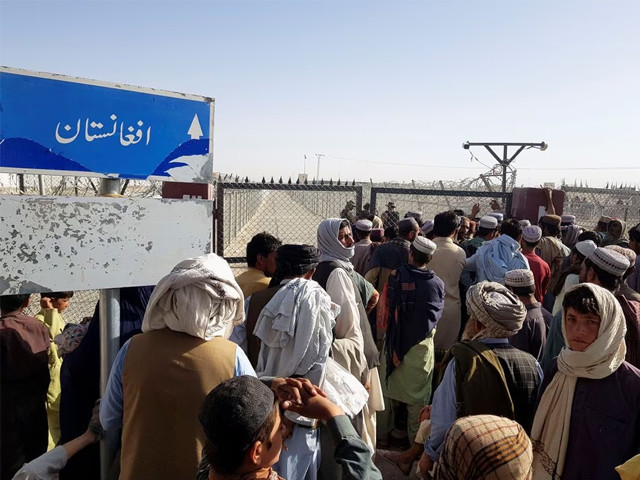There is a sense of irony in the decision to ‘repatriate’ or ‘evict’ illegal refugees, considering how the country is facing a brain-drain of Pakistanis. Although not referred to by name since most refugees residing in Pakistan are Afghan nationals, it is hard not to presume that this decision is targeted towards them. Given that we are preparing for the return of Nawaz Sharif and the upcoming elections, yet there are droves of people leaving the country. We have a long list of reasons why people are leaving to choose from, but there’s just one reason why refugees have decided to leave their country for ours.
Despite never signing any international treaty to host refugees, Pakistan has been welcoming and facilitating millions of refugees – most of whom are Afghan nationals. However, starting in November, the government is allowing the deportation of immigrants who illegally entered the country (approximately 1.7 million). It wouldn’t be too far-fetched to consider that this decision is rooted in the souring relationship between Kabul and Islamabad, exacerbated by the recent bombings that involved people of Afghan origin and Pakistan’s repeated demand for the Afghan-Taliban government to take action against the Tehreek-e-Taliban Pakistan (TTP).
But the decision to force asylum-seekers out of the country seems too impetuous, inviting further anti-refugee sentiment, imprisonment of legally recognised refugees, extortions and even loss of life.
There is a view that repatriation is sending refugees back home; this is flawed and misguided.
Repatriation is no simple task, and the act seems less fruitful when forcefully migrating hundreds of thousands of refugees. Refugees have no homes to return to; either they were destroyed or repossessed, and the UNHCR has stated that forced migrations, such as this case, will only worsen the situation in refugees’ home country – trickling down to our country. In order to have an effective repatriation, it comes down to it being voluntary, and for repatriation to seem promising, political, social, economic and cultural rights must be restored.
The UNHCR had helped repatriate 16,000 Afghans in the last two years, a meagre amount compared to the millions of other Afghans (the majority of refugees) left in Pakistan. Voluntary repatriation is not an easy process, and bearing in mind the current situation in Afghanistan, the prospect of voluntary migration is unlikely.
Thus bringing up the push for forced migration. The thought-process of moving these refugees back to their home countries will relieve our economic expenses, but would it really? Suppose we have to consider transportation, human resources and other expenditures, which all depend on the origin countries’ willingness (the Afghan Taliban don’t seem all that willing) to accept these refugees. In that case, it is all uphill from there.
There is no clear plan on how the Pakistani government will move foreign nationals, seemingly allowing local authorities to enact whatever force they deem fit. In his announcement on Tuesday, Interior Minister Sarfraz Bugti talked about how the businesses of these deported Afghans will be taken from them and that a task force is constituted to help implement this drastic initiative. The government is also enticing citizens to send anonymous tips on information about illegal immigrants and illegal practices. Yet this push doesn’t help explain the viability of the government confirming the legal residency of 1.7 million (the real number is unknown) illegal residents.
Cases of mistreatment and arbitrary arrests have been popping up in recent news. Last Sunday, there were a total of 800 Afghan nationals arrested in Islamabad, where 425 were released after confirming their legal residency, while the remaining 375, lacking legal documentation, remain in custody and set for deportation. Innocent Afghan nationals are in the crossfire from these crackdowns, and what’s more worrisome is the risk that those who legally entered the country are awaiting their Proof of Registration (PoR) cards but, due to the slow bureaucratic process, could be perceived as illegal aliens.
Recently, at the Friendship Gate of Chaman Border Crossing, an Afghan sentry killed two Pakistani citizens, including a child, while injuring another child, validating Afghan nationals’ legitimate sense of danger. The United Nations reported over 1,600 rights violations by the Taliban involving torture and deaths in custody, where one in 10 of the violations were against women.
It would benefit Pakistan greatly if they decided on accessioning the 1951 Refugee Convention and 1967 Protocol. By signing this convention, Pakistan would have an easier time determining legal refugees, which would also help drive the international community to provide more financial aid to help refugees, thus lessening economic expenses. Accepting the convention, asylum-seekers in Pakistan will be given more mobility with now being able to pursue education, healthcare, bank accounts, and employment.
The expulsion of millions of undocumented immigrants would be a case that sounds great in theory but bad in practice. Most of those undocumented are Afghan nationals, and the “security concern” mentioned doesn’t mean that all undocumented are considered a security risk. But if this was truly a security concern, shouldn’t the sparse borders be focused rather on the refugees? Shouldn’t there be security concerns for women, children and families that we’d be sending back to possible political ramifications? Shouldn’t there be security concerns for those undocumented being extorted? Shouldn’t there be security concerns for legal refugees? The immigrant issue seems like a scapegoat for other underlying problems.



COMMENTS
Comments are moderated and generally will be posted if they are on-topic and not abusive.
For more information, please see our Comments FAQ